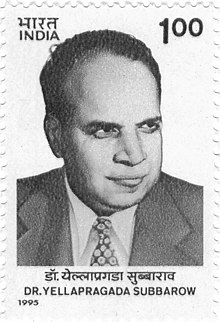Yellapragada Subbarow | |
|---|---|
 Commemorative postage stamp celebrating Subbarow's birth centenary | |
| Born | 12 January 1895 |
| Died | 8 August 1948 (aged 53) |
| Nationality | British Empire, India, United States |
| Alma mater | Harvard Medical School Madras Medical College |
| Known for | Discovering the role of phosphocreatine and adenosine triphosphate in muscular activity; synthesis of folic acid; synthesis of methotrexate; discovery of diethylcarbamazine |
| Scientific career | |
| Fields | Biochemistry |
| Institutions | Lederle Laboratories, a division of American Cyanamid (Acquired by Wyeth in 1994, now Pfizer) |
Yellapragada Subbarow[a] (12 January 1895 – 8 August 1948) was an Indian American biochemist who discovered the function of adenosine triphosphate (ATP) as an energy source in the cell,[1] developed methotrexate for the treatment of cancer and led the department at Lederle laboratories in which Benjamin Minge Duggar discovered chlortetracycline in 1945.
A student of Madras Medical College, his elder brother and younger brother both died due to tropical sprue in the span of 8 days. He subsequently discovered folic acid as a cure for tropical sprue. He discovered methotrexate, a chemotherapy drug still used today and also used for rheumatoid arthritis, and diethylcarbamazine (DEC), the only effective drug for treating filariasis. Most of his career was spent in the United States. Despite his isolation of ATP, Subbarow did not gain tenure at Harvard University[2][3] though he would lead some of America's most important medical research during World War II. He is also credited with the first synthesis of the chemical compounds folic acid and methotrexate.
Cite error: There are <ref group=lower-alpha> tags or {{efn}} templates on this page, but the references will not show without a {{reflist|group=lower-alpha}} template or {{notelist}} template (see the help page).
- ^ Maruyama, Koscak (1 March 1991). "The discovery of adenosine triphosphate and the establishment of its structure". Journal of the History of Biology. 24 (1): 145–154. doi:10.1007/BF00130477. S2CID 87425890.
- ^ Mukherjee, Siddhartha (2010). The Emperor of All Maladies: A Biography of Cancer. Simon and Schuster. p. 31. ISBN 978-1-4391-0795-9. Retrieved 6 September 2011. Quote: "Any one of these achievements should have been enough to guarantee him a professorship at Harvard. But Subbarao was a foreigner, a reclusive, nocturnal, heavily accented vegetarian who lived in a one-room apartment downtown, befriended only by other nocturnal recluses"
- ^ Pushpa Mitra Bhargava (2001). "History of Medicine: Dr. Yellapragada Subba (1895–1948) – He Transformed Science; Changed Lives" (PDF). Journal of the Indian Academy of Clinical Medicine. 2 (1, 2): 96_100.